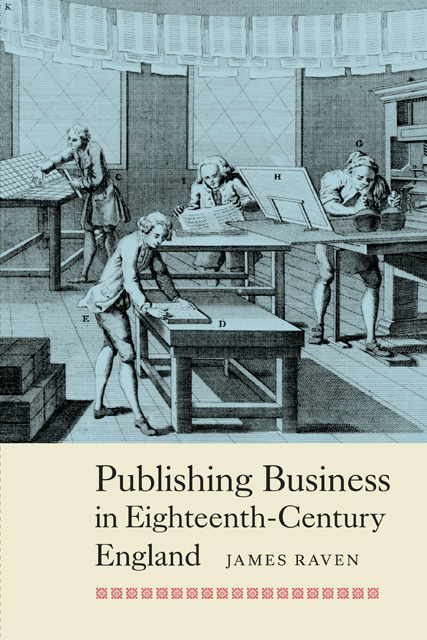Book contents
- Frontmatter
- Dedication
- Contents
- Acknowledgements
- Notes on Dates, Booksellers, Founts and Intaglio
- List of Abbreviations
- 1 The Mediation of the Press
- 2 England and the Uneven Economic Miracle
- 3 The Printed and the Printers
- 4 Serviced by Stationery and Printing
- 5 Printing and the City of London
- 6 Advertising
- 7 The Advertisers
- 8 Intelligence
- 9 Instruction and Guidance
- 10 Wider Discussion
- 11 Business, Publishing and the Gentleman Reader
- Conclusion
- Bibliography of Printed Sources
- Index
5 - Printing and the City of London
Published online by Cambridge University Press: 28 February 2023
- Frontmatter
- Dedication
- Contents
- Acknowledgements
- Notes on Dates, Booksellers, Founts and Intaglio
- List of Abbreviations
- 1 The Mediation of the Press
- 2 England and the Uneven Economic Miracle
- 3 The Printed and the Printers
- 4 Serviced by Stationery and Printing
- 5 Printing and the City of London
- 6 Advertising
- 7 The Advertisers
- 8 Intelligence
- 9 Instruction and Guidance
- 10 Wider Discussion
- 11 Business, Publishing and the Gentleman Reader
- Conclusion
- Bibliography of Printed Sources
- Index
Summary
Eighteenth-century London acted as a principal clearing centre for financial and commercial agreements, and for the development of public and private investment in bonds and stocks and in insurance against risk and disaster. In the provinces there followed a gradual enlargement of the money market and of credit and insurance services, but London (and for particular services and printing, particular parts of London) continued to be the hub of affairs.
Without the work of the metropolitan printer it is impossible to explain the success of the financial experiments of the 1690s: the stock-jobbing explosion of the late seventeenth and early eighteenth centuries, the fledgling structure of public credit, confidence in currency transactions, new mercantile and retailing initiatives or even late-eighteenth-century country banking. The sheer weight of paper was dazzling. During the century, many hundreds of printer-stationers were employed in providing the bonds, notes of authorization and redemption, company proposals, certificates, vouchers, policy forms, indentures and other business blanks ordered by both London and country customers. The surviving ledgers of William Strahan, probably the richest printer of the century, reveal not only his printing of editions of Pope or of the Vicar of Wakefield, but also major contracts for expensive jobbing work.
From the final quarter of the seventeenth century, the potential for print applications was already obvious to major mercantile houses. Powerful merchants like William Braund or Samuel Eyre clearly appreciated the security and authority offered by overseas trading bills of exchange and part-printed blanks for description, lading and receipt. The market for merchants’ bills for investment depended upon the safeguards offered by letterpress forms against fraud and misrepresentation. Blanks were produced for a variety of bills of exchange, but also for routine bills drawn by merchants on their overseas correspondents and agents, and for monthly accommodation bills in the bullion trade or special cargoes. The products of London’s presses not only quickened exchange procedures, but also meant that the capital was already challenging Amsterdam as a new exchange centre and bill market by the 1720s. By the 1730s, large operators like Samuel Brooks, Abraham Coleman and Joseph Watkins both generated and depended upon a great bulk of blanks and printed bills.
- Type
- Chapter
- Information
- Publishing Business in Eighteenth-Century England , pp. 85 - 113Publisher: Boydell & BrewerPrint publication year: 2014

